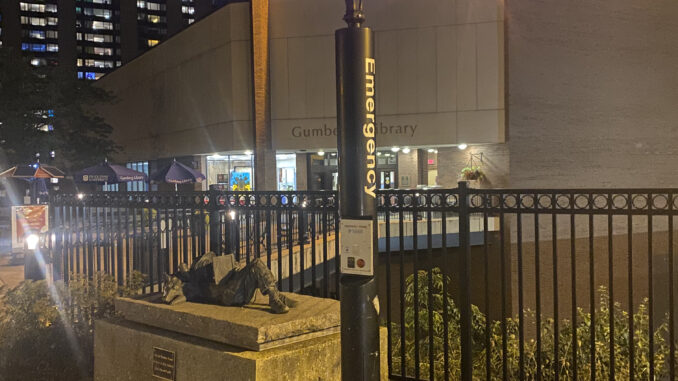
Zach Petroff | Opinions Editor
Sept. 8, 2022
Long after classes have ended for the day, the night falls upon the Bluff, as if to transform the university into a small village for Duquesne students. Just hours before the streets were filled with the rustling of students, faculty and administration to only be taken over by undergrads by nightfall. Young people can be seen and heard all across the campus enjoying their freedom from the clutches of their classes.
There is a calm atmosphere on campus after hours, as if the university was separate not only from the city of Pittsburgh, but the rest of the world. Yet, the reality is that while there is a sense of tranquility, there are real-world dangers that can put students at risk.
The university’s Department of Public Safety, led by the newly hired Chief of Police Eric Holmes, has prioritized providing a safe environment for students, faculty, staff and visitors through crime prevention and safety awareness. An elaborate set of protocols utilizing technology and an experienced police force have been put into place to help mitigate and prevent crime and unsafe behavior.
The department requires its officers to partake in internal training standards and prepares officers for events such as active shooter training, incident command training, first aid and CPR. They have a partnership with the City of Pittsburgh.
“Our department consists of Act 120 Pennsylvania state-certified police officers, security guards, communications specialists and civilian employees who work each day to prevent crime, and solve problems here on the Duquesne University campus,” Holmes said in an email. “The Duquesne University Police Department is exceptional due to the amazing staff we have working for this great university. The DUPD maintains and will strive to continue to maintain the highest professional standards.
Duquesne, accredited since 2009, has employed the use of an alert system, which is an automated message notification system used to contact students and employees about emergencies or major disruption to campus service. Along with the DU emergency messages, the university has an outside warning system that will sound a tone and voice message announcing the nature of an emergency and the placement of over 3000 emergency duress alarms around campus. When activated, the alarms connect directly to Public Safety. They resemble fire alarms.
The safety escort service can be utilized by students and staff. The service is designed to enhance safety and peace of mind for those who may have to walk alone. Escorts will be provided by either a campus security officer or a campus police officer. The security and police personnel carry radios, identification and will be in a designated uniform. In order to reach an escort, students can call the campus police number at 412-396-6002.
According to a recent report conducted by the Allegheny Department of Human Resources in July, homicides have increased by 27% in the county and by 43% in the city from 2019 to 2021. In their 2021 Annual Security Report, Duquesne University has shown a decrease in crime from 2019 to 2020. The annual security report does note that there are “different mandates under the Clery Act and the Uniform Crime Reporting Act for the classification and statistical counting of crimes, which may result in differences in the way statistics are counted.” Duquesne University moved to remote learning on March 16, 2020, and encouraged students to move off campus on March 22 in the same year.
One of the crucial points in Holmes’ plan of action to ensure safety is communication.
“Everyone has a part to play when it comes to safety. If you see something say something,” Holmes said in an email.
Another crucial part of ensuring safety is knowing what to do in case of an emergency after hours.
The campus emergency number is 412-396-2677. There are also eight blue emergency phones on campus that go straight to the DUPD emergency communication center. Immediately after establishing the connection with the Campus Police, the phone will send a signal indicating to them the location of the activated station. Once the system is activated, it allows students to have hands-free communication directly with the campus police.
With the safety of this campus being a combined effort from both the staff and the student body, it is paramount that students are aware of the procedures that are set in place.
Emily Hrivnak, a sophomore who resides in Des Places Hall, is aware of the pending threats that can happen on campus after hours.
“There’s always that thought, just walking around in the dark at night that anyone can always just come up and grab me, because I can’t really do much, I’m so small,” Hrivnak said. “But it’s not terrible. There’s an anxiousness just because of who I am.”
However, she does feel safe on campus.
“I’m normally always with people unless I’m probably coming back from work or something like that,” Hrivnak said.
Brianna Finn, a fourth-year student feels that Duquesne is safe, but would like to see more blue lamp postings.
“I would say I would like to see [blue lights] on the outskirts of buildings, toward Liebermann [Hall] or the ones on Fifth Avenue,” Finn said. “I know they are a little bit, so maybe more blue lights or maybe an officer in that area would be safer, but I don’t feel like they’re necessarily unsafe.”
While the semester continues on, and students and faculty start to relax in their routine, the urgency to stay vigilant and aware of surroundings can melt away
Duquesne students, faculty and the safety department must all do their part to keep safe.
